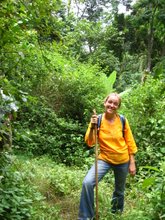
At this point in the semester, halfway through the program, I’ve begun to branch out from routine, and acquainted myself with some new people. It’s been advantageous to attend university courses less and leave the UDSM campus more often. Last week I finally saw Salma for the first time since we met during an Amsterdam layover last year. Salma’s the head of the Three Sister’s Foundation, a Feminist activist group she established in Dar. I first saw her last year when I was boarding the plane in Dar for Chicago. She was talking back to an airport bureaucrat, telling him not to harrass her (something about her passport). Her spunkiness was impressive, all the more so because she’s slight in build and modest in appearance. She wears glasses that hide her beautiful eyes and wraps a scarf in a style common on Zanzibar. I didn’t talk to her at first at this time and didn’t see her again until we got off the plane in Amsterdam. Maybe I was intimidated by her strength at first. But I began a conversation when I saw her buying coffee at “Paul” a French Boulangerie, and we talked for 2 hours before boarding our respective flights about her work at the feminist NGO, and her trip to Copenhagen, where she’d been invited to give a presentation at a conference.
Over the last year I haven’t had much contact with Salma, but I got in touch with her when I first arrived in Dar in January. While we spoke by phone she unpacked her bags from a long absence—first she’d visited an uncle in Arizone for a month, then she attended the World Social Forum in Nairobi (this is the global forum for NGOs to meet and strategize for the upcoming year, an opportunity to rival/subvert the simultaneous G8 conference of superpowers that meets in Europe).
Over the last 2 months, we’ve tried to get together. Salma lives near Kunduchi Beach (not an easy jaunt from here), so she called me on her way to Mwenge Market (10 mins from here by daladala). I was busy. I called her to invite her to dinner, but, as it turned out, the power failed and we couldn’t cook anything. She took a trip to Zanzibar during the recent Music Festival in February, then stayed there for a few weeks. By the time she returned, her Feminist Institute was about to begin.
She invited me to participate in the institute, and of course I agreed, but we never talked on the phone long enough for me to get a substantial idea of the format or objectives. I was surprised she was so open to my participation, I guess because I was left with a memory as an undergrad doing study abroad in Senegal, when people warned me to stay away from this sensitive topic or activist issue; they said white women’s focus on it tended to piss Senegalese women off.
On Wednesday I took a taxi to the Ardhi House, a 10 minute walk from Mwenge. The Institute had begun a week before, so I was joining on “debriefing” morning, during which the 20 or so women were giving a status report on what they’d learned, enjoyed, found challenging, etc. Since the discussion was in Kiswahili, I had some trouble deciphering it. I got the main ideas, though, esp because they were focusing on emotions and reactions. Some of the exercises were physical, too, with women walking around the room to express their response to the questions Salma posed them. I think they said they were delighted with Salma’s openness, surprised that they had learned so much about feminism, and excited to develop their independent research projects in the next few weeks.
This diverse group comes from many parts of the country: Songea, Mbeya, Kibera, as well as cities like Arusha, Moshi, Dodoma, Dar and of course Zanzibar. Some women are activists, others are academics or teachers. There’s real bonding and solidarity going on, thanks to Salma’s careful planning (women applied to be a part of it, and it was a selective process).
The first day, Wednesday, I just listened. The second day, Friday, I worked with one group of women who had relatively proficient in English. We focused their research ideas and reviewed the basic components of a research paper. By the end we devised a working thesis or two. I shared with them things I’d learned as a writing instructor in the freshmen liberal arts classes, and they seemed genuinely happy (if nervous to get started on their projects). Salma’s doing some really important work here, empowering Tanzanian women personally and intellectually. Some of the research ideas involve reproductive health and family planning counseling for girls 15-18, prostitution, and obstacles to secondary school education. Students were surprisingly open to my suggestions, and I was amazed by their passion and enthusiasm. It’s no small feat for them to write 20-page papers in English (I haven’t really touched on this topic, but most Tanzanians use Kiswahili in school until secondary school, which means they suddenly have to learn and write in English. It makes for a very lopsided proficiency). This week students will propose their research projects to the group, and we’ll give feedback. I also offered to read drafts.
Other acquaintance news: I attended an Alliance Francaise course with Professor Christophe (who also teaches at UDSM), and comes from Normandy. The Tanzanian students in my class are very sweet and I’m sure we’ll get to know each other. P leaves for South Africa on Friday, and I may go to Kipepeo Beach with Kat, an American Rotary Fellow, and a friend of hers for Saturday. There’s a concert Thursday—a Malian musician named Ba Cissoko sponsored by the French Embassy.

No comments:
Post a Comment